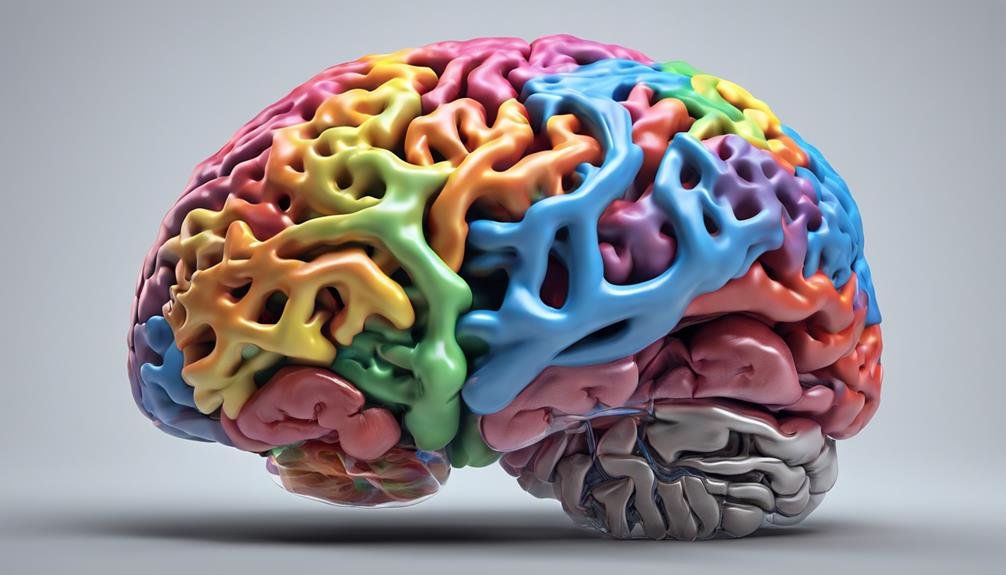Neurobiological Correlates of Personality: An Overview
Imagine a scenario where an individual's high levels of neuroticism are linked to an overactive amygdala, resulting in heightened emotional reactivity and stress responses. Understanding how neural circuits and neurotransmitter systems contribute to personality traits offers a fascinating glimpse into the intricate web of factors shaping who we are. As you explore the neurobiological underpinnings of personality, you'll uncover the biological basis of behavior and the fascinating interplay between brain functions and individual differences.
Key Takeaways
- Prefrontal cortex influences conscientiousness and impulsivity in personality traits.
- Amygdala is linked to neuroticism and emotional stability.
- Neurotransmitters like dopamine, serotonin, and norepinephrine impact behavior and personality traits.
- Genetic factors and environmental influences interact to shape personality development.
- Neuroplasticity plays a crucial role in adaptive behaviors and personality traits.
Brain Structures and Personality Traits
Understanding the relationship between brain structures and personality traits is essential for unraveling the neurobiological basis of individual differences in behavior and cognition.
Personality traits have been linked to specific brain regions, shedding light on the neural underpinnings of various behavior patterns. Research indicates that different brain regions play key roles in shaping personality traits.
For example, the prefrontal cortex is associated with decision-making and impulse control, influencing traits like conscientiousness and impulsivity. The amygdala, known for its role in emotional processing, is linked to traits such as neuroticism and emotional stability. Additionally, neurotransmitter roles within these brain regions further modulate personality traits.
Dopamine, for instance, affects traits related to reward processing and motivation. Serotonin levels have been correlated with traits like mood regulation and social behavior.
Neurotransmitters and Behavioral Patterns
When considering how brain chemistry influences behavior, it's important to examine the role of neurotransmitters in shaping personality traits.
Neurotransmitters such as dopamine, serotonin, and norepinephrine play significant roles in regulating mood, reward processing, and stress responses, which in turn impact behavioral patterns.
Understanding the intricate interplay between neurotransmitter functioning and behavioral tendencies can provide valuable insights into the neurobiological underpinnings of personality.
Brain Chemistry and Behavior
Your behavior is intricately linked to the levels and functioning of various neurotransmitters in your brain, influencing your personality traits and patterns of interaction with the world. Research has shown that imbalances in neurotransmitters such as serotonin, dopamine, and norepinephrine can lead to distinct behavior patterns and even contribute to the development of personality disorders.
For instance, low levels of serotonin have been linked to impulsivity, aggression, and mood disorders. On the other hand, dopamine is associated with reward-motivated behavior, pleasure, and reinforcement learning. Norepinephrine plays a role in attention, focus, and arousal levels.
Studies have also indicated that alterations in brain activity related to neurotransmitter imbalances can impact behavior. For example, individuals with low levels of serotonin may exhibit heightened emotional reactivity due to altered neural responses in regions associated with emotion regulation.
Understanding the intricate relationship between neurotransmitters and behavior patterns is essential in comprehending how brain chemistry influences personality traits and the manifestation of various psychological conditions.
Neurotransmitter Roles in Personality
Neurotransmitters such as serotonin, dopamine, and norepinephrine play essential roles in shaping behavioral patterns and personality traits through their intricate interactions within the brain. Imbalances in these neurotransmitters have been linked to various personality disorders, highlighting the significance of their role in shaping human behavior.
Serotonin, known for its regulatory function in mood and emotions, influences traits like impulsivity, aggression, and anxiety. Low levels of serotonin have been associated with an increased risk of developing conditions such as depression and obsessive-compulsive disorder, impacting personality traits related to these disorders.
Dopamine, a key player in the brain's reward system, affects motivation, pleasure, and reinforcement learning. Dysregulation of dopamine levels is linked to traits like sensation-seeking, impulsivity, and risk-taking behaviors, which are often observed in individuals with personality disorders such as antisocial personality disorder.
Norepinephrine, involved in the body's stress response, influences traits like vigilance, attention, and arousal. Imbalances in norepinephrine have been associated with conditions like post-traumatic stress disorder, affecting personality traits related to heightened arousal and reactivity.
Understanding the intricate interplay between neurotransmitters and personality can provide valuable insights into the underlying mechanisms of various behavioral patterns and disorders.
Genetics and Personality Development
The role of genetic factors in shaping personality traits has been extensively studied and is considered a significant influence on individual differences in personality development.
Environmental influences play a pivotal role in how genetic predispositions interact to mold personality traits. Studies have shown that while genetic factors provide a foundation for personality development, environmental influences can modify gene expression through epigenetic mechanisms, leading to variations in personality traits.
Epigenetic factors, such as DNA methylation and histone modifications, can regulate gene activity without altering the underlying genetic code, thereby playing an essential role in shaping personality over time.
Research indicates that the interplay between genetic predispositions and environmental factors is dynamic and complex, contributing to the unique personality profiles observed in individuals.
Understanding the intricate relationship between genetic influences, environmental inputs, and epigenetic mechanisms is essential for unraveling the underlying processes involved in personality development.
Hormones' Influence on Temperament
Hormones play a significant role in modulating temperament by influencing physiological processes that contribute to behavioral tendencies and emotional responses. The endocrine system, responsible for hormone production and regulation, plays an essential role in shaping an individual's mood regulation.
For example, cortisol, often referred to as the stress hormone, is intricately involved in the body's response to stress and can impact how individuals react to challenging situations.
Moreover, hormones like testosterone and estrogen have been linked to aggression and nurturing behaviors, respectively, highlighting their significance in shaping temperament traits. The intricate interplay between various hormones, neurotransmitters, and neural circuits further underscores the complexity of how hormones influence temperament.
Research suggests that dysregulation in hormone levels can lead to disturbances in mood regulation, potentially contributing to personality traits associated with mood disorders. Understanding the role of hormones in temperament can provide valuable insights into the neurobiological underpinnings of personality development and may offer new avenues for interventions targeting mood and behavioral dysregulation.
Neural Networks and Identity Formation
Traversing through the intricate web of neural networks is essential in understanding the process of identity formation. When exploring neural networks in relation to identity formation, one key aspect is memory consolidation. This process involves the strengthening of neural connections formed during experiences that are significant to one's sense of self. Through memory consolidation, these neural connections become more stable and resistant to decay, contributing to the formation and maintenance of one's identity over time.
Neural connectivity plays a vital role in shaping identity by establishing pathways that are repeatedly activated, solidifying specific traits, beliefs, and behaviors. These neural networks create a framework through which individuals perceive themselves and interact with the world. The interplay between different regions of the brain, facilitated by neural connectivity, helps integrate diverse aspects of one's personality into a coherent sense of self.
In essence, neural networks and identity formation are intricately linked through processes like memory consolidation and neural connectivity, highlighting the neural underpinnings of who we are.
Neuroplasticity and Adaptive Behaviors
Your brain's ability to change in response to experiences, known as neuroplasticity, plays a vital role in shaping adaptive behaviors.
These changes occur through adaptive neural responses that allow for the development of new skills and the modification of existing behaviors.
Understanding the intricate relationship between neuroplasticity and adaptive behaviors provides valuable insights into how personality traits can be influenced and shaped by neural processes.
Brain Changes and Behavior
Neuroplasticity, the brain's ability to reorganize itself by forming new neural connections, plays a pivotal role in shaping adaptive behaviors and influencing changes in behavior.
Personality changes, which are often influenced by external stimuli and environmental factors, can be traced back to neuroplasticity mechanisms.
Behavioral neuroscience delves into the intricate relationship between brain changes and behavior, highlighting how the brain's flexibility allows for the adaptation to new experiences and challenges.
Through processes like synaptic pruning and neurogenesis, the brain can modify its structure and function in response to various stimuli, ultimately impacting behavior.
Studies have shown that individuals with higher levels of neuroplasticity tend to exhibit greater resilience and adaptability in the face of adversity.
Understanding the neurobiological underpinnings of personality changes and adaptive behaviors provides valuable insights into how the brain continuously evolves and adapts to the ever-changing environment.
Adaptive Neural Responses
Adaptive neural responses, particularly linked to neuroplasticity mechanisms, are pivotal in shaping behaviors and facilitating adaptive responses to environmental stimuli. Neural plasticity plays a fundamental role in personality adaptation, allowing individuals to adjust their responses based on experiences.
Stress response is intricately connected to neural plasticity, with chronic stress potentially leading to maladaptive changes in the brain. Emotional resilience, a key component of adaptive behaviors, is closely tied to the brain's ability to reorganize neural pathways in response to challenges.
Research suggests that individuals with higher emotional resilience exhibit greater neural plasticity, enabling them to cope effectively with stressors. This resilience is often associated with enhanced brain connectivity, allowing for efficient communication between different regions involved in emotional regulation.
Understanding the interplay between neural plasticity, emotional resilience, and brain connectivity provides valuable insights into how individuals adapt to varying environmental demands. By fostering adaptive neural responses through promoting neuroplasticity and emotional resilience, individuals may enhance their ability to navigate complex situations and maintain psychological well-being.
Emotional Regulation in the Brain
Exploring the neural mechanisms underlying emotional regulation in the brain reveals intricate pathways involved in modulating affective responses. When it comes to stress response, the amygdala, prefrontal cortex, and hippocampus play essential roles. The amygdala, known for its involvement in processing emotions, particularly fear, triggers the release of stress hormones in response to perceived threats.
Concurrently, the prefrontal cortex, responsible for executive functions such as decision-making and emotional regulation, modulates the amygdala's activity to regulate the stress response. Additionally, the hippocampus, crucial for memory formation, helps contextualize stressors and regulate the stress response accordingly.
In terms of mood regulation, the brain's serotonin system is crucial. Serotonin, a neurotransmitter implicated in mood stability, is synthesized in the raphe nuclei and then projected throughout the brain. Dysregulation of the serotonin system is often linked to mood disorders like depression and anxiety. Understanding the intricate interplay between these neural circuits provides insights into how emotional regulation is orchestrated within the brain.
Cognitive Functions and Personality
Understanding the relationship between cognitive functions and personality involves investigating how various brain regions and processes influence individual traits and behaviors. Personality assessment plays a vital role in determining how cognitive processing styles are linked to different personality traits.
Research suggests that cognitive functions such as attention, memory, and problem-solving skills are closely intertwined with personality characteristics like openness, conscientiousness, and neuroticism. Individuals with strong cognitive processing abilities may exhibit traits associated with higher levels of extraversion, intelligence, and emotional stability.
Moreover, cognitive processing has been found to impact decision-making processes, risk-taking behaviors, and social interactions, all of which are key components of personality. For instance, individuals with efficient cognitive processing skills may be more likely to engage in proactive problem-solving strategies and exhibit adaptive behaviors in various social situations.
Understanding the intricate relationship between cognitive functions and personality can provide valuable insights into how individuals perceive and interact with the world around them.
Neuroimaging Studies on Traits
Neuroimaging studies provide valuable insights into the neural underpinnings of specific personality traits, shedding light on the biological correlates associated with individual differences in behavior and cognition.
Through neuroimaging techniques such as functional magnetic resonance imaging (fMRI) and positron emission tomography (PET), researchers have been able to investigate the brain regions and networks involved in various personality traits.
Studies have shown that certain personality disorders, such as borderline personality disorder, are associated with abnormalities in the prefrontal cortex and amygdala. These regions play essential roles in emotional regulation and decision-making processes.
Additionally, neuroimaging research has linked specific cognitive abilities, such as working memory and attention, to variations in gray matter volume in the frontal and parietal regions of the brain.
Understanding the neurobiological basis of personality traits through neuroimaging studies not only provides valuable information for clinical diagnoses and interventions but also contributes to our knowledge of the neural mechanisms underlying complex human behaviors.
Conclusion
So, now you know how your brain structures, neurotransmitters, and genetic makeup all come together to create your unique personality traits.
Your hormones and neural networks also play a role in shaping who you are.
Remember, your brain is constantly adapting and changing, so you have the power to develop new behaviors and regulate your emotions.
Keep exploring the fascinating world of neurobiology and personality to better understand yourself and others.







